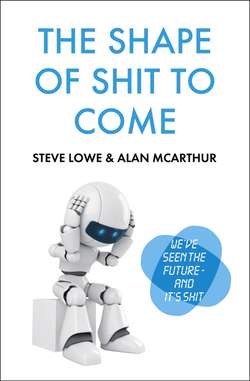Читать книгу The Shape of Shit to Come - Steve Lowe - Страница 13
Robots in the house
ОглавлениеClearly robots have not happened as envisaged in the futuristic fantasies of yore. Here in the West, we do not appear to be surrounded by domestic robot slaves and are not joined in the workplace by spooky near-human androids. There have been delays. Philip K. Dick’s Do Androids Dream of Electric Sheep? – the novel which became Blade Runner – was originally set in 1992. As you may recall, 1992 was the year of the Maastricht Treaty and Brian May’s solo single ‘Too Much Love Will Kill You’. But not near-human replicant serfs suddenly breaking free and being hunted down by bounty hunters in a fictional-philosophical inquiry into empathy. Not that.
No one who has seen any of the current robots, in all their stumbling whirring glory, can be too terrified that they are about to break free, or take over, or even successfully make some tea. In the main, these prototype humanoids tottering about their labs are highly expensive idiots who fall over all the time.
Most chores, like washing up, are sadly still beyond most robots. Anyone seeking to employ current modern-day robot helpers for such purposes would face a great many chipped cafetière pots. (Is a dishwasher a robot, though? This is the sort of question we must get our heads around.)
But we do have robot hoovers: for £200, you can now buy the Roomba robot vacuum cleaner, a large disc which scoots around the floor sucking up dirt, produced by pioneering US company iRobot. iRobot co-founder Helen Greiner recalled people’s preconceptions before the product launch: ‘Focus groups imagined it would look like the Terminator pushing a vacuum cleaner and told us they would not accept such machines in their homes.’ Which seems a fair judgement. Who wants the Terminator crashing round their house?
In Germany, they have robots maintaining the sewers. This seems like tempting fate. If robots are going to take over then coming up out of the sewers is exactly the sort of dramatic touch they’ll be looking for. They’re called Autonomous Sewer Robots. Perhaps the word autonomous worries you? It should: it means they can do whatever the hell they fucking well like down there.
In a similarly worrying move, the University of the West of England has produced a ‘release and forget’ bot that powers itself by ‘eating’ flies. It’s called Lord of the Flies. No it isn’t. It’s called EcoBot II. It ‘shits’ little waste pellets. Then there’s the so-called Vampire Bot, a tiny fuel cell that powers itself on blood. It’s based in Texas, but a team of Japanese scientists is working on a similar project. For fuck’s sake – don’t help them drink our blood!
Anyway, out in the real world the cost of robot workers has fallen sharply against the cost of actual worker workers. Amazon’s warehouses are run by short orange robots designed by Kiva Systems – a bit like Ooompa Loompas, but robots (they don’t sing. Well, they might – I don’t actually know). Scientists are even looking at replacing migrant labour picking cauliflower crops in East Anglia. The economy has been relatively open to cheap migrant labour, but needs robots because they have all pissed off home. Maybe the robots will up sticks too. Leaving the cauliflowers to rot on the, er, vine.
Some believe robot labour will impact on some humans in quite a negative way: unemployment. Already robots are being developed for everything from construction to surgery to scientific experimentation. Marina Gorbis, head of Californian thinktank The Institute for the Future, reckons the coming decade will see fancy Dan intelligent robots coming for the white-collar jobs that can be automated (like clerical and admin work, and the law) and believes we should concentrate on training our children for only the non-codifiable, non-repetitive, non-routine jobs that require ‘higher-level thinking’. Which is, clearly, not many jobs. (Gorbis suggests training kids to make Internet videos or, er, robots. Great.)
A robot-led labour market could leave humans free to fulfil their potential as creative thinkers, inventors, philosophers, artists and artisans. (Which might not be so great: have you met most people?) Or it could leave everyone skint.
But hey, what are you going to do? Smash up the robots like the Lancashire spinners smashed up the Spinning Jenny? We could do that. But that would definitely be asking for some kind of robot uprising. Spinning Jennies could not fight back, not even by spinning. Could the robots? Of course they could. They’d bloody love it.
